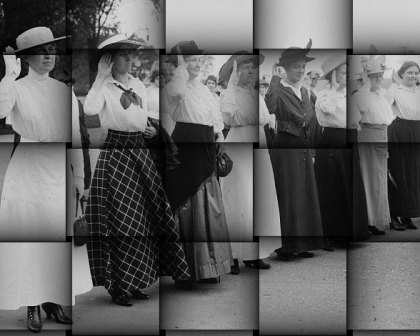
But this is not about the presidential race of 2016. This is about 1916, the year that Woodrow Wilson won re-election. And while a century separates the two elections, the issues and philosophies are familiar. Here is the rundown:
The candidates:
The Democratic candidate was the incumbent, Woodrow Wilson. The Republican, Charles Hughes, had been a Supreme Court justice and governor of New York. The socialist in the running, Allan L. Benson, had been a newspaper editor and writer. The Bull Moose Party chose Theodore Roosevelt as its candidate, but Roosevelt declined the nomination. He supported Hughes.
Women’s suffrage:
This was the last election in which only men could vote. Wilson did not publicly endorse women's right to vote until 1918 -- after his re-election. (See: The Wilson Center: Woodrow Wilson and the Women's Suffrage Movement -- A Reflection.) The Democratic platform recommended “the extension of the franchise to the women of the country by the States upon the same terms as to men.” The Republican platform favored extension of suffrage to women, but added that it was “the right of each state to settle this question for itself.” The 19th Amendment granting women the right to vote was ratified Aug. 18, 1920.
Defense:
The public was not anxious to jump into the war in Europe, and Wilson used this as a slogan: “He kept us out of war.” Even so, leaders were clearly struggling to define the country's role in the world.
The Republican Party’s platform spoke of the need for strong defense: “We must have a Navy so strong and so well proportioned and equipped, so thoroughly ready and prepared, that no enemy can gain command of the sea and effect a landing in force on either our Western or our Eastern coast. To secure these results we must have a coherent continuous policy of national defense, which even in these perilous days the Democratic Party has utterly failed to develop, but which we promise to give to the country.”
A distinctly different view was offered by socialist candidate Benson, author of the book, “Inviting War to America.” The book begins: “In this country, at this moment, is being made what is perhaps the greatest attempt of its kind in all history to stampede a nation into an act of monumental folly. For many years, the interests that believed they could derive profit, in one way or another, from making this a great military power have been trying to make it a great military power.”
Five months after Wilson’s election, April 6, 1917, the U.S. declared war on Germany.
Labor:
Both platforms reflected voters' concerns about working conditions -- and the influence of the labor movement. The Democratic Party platform rattled off a number of pro-labor initiatives, including “the creation of a Federal Bureau of Safety in the Department of Labor, to gather facts concerning industrial hazards, and to recommend legislation to prevent the maiming and killing of human beings.”
The Republican platform pledged “to the faithful enforcement of all Federal laws passed for the protection of labor.” It also called for “the collection and collation, under the direction of the Department of Labor, of complete data relating to industrial hazards for the information of Congress, to the end that such legislation may be adopted as may be calculated to secure the safety, conservation and protection of labor from the dangers incident to industry and transportation.”
The environment:
Democrats favored “the conservation and development of the natural resources of the country through a policy which shall be positive rather than negative, a policy which shall not withhold such resources from development but which, while permitting and encouraging their use, shall prevent both waste and monopoly in their exploitation.” The Republican policy called for “careful husbandry of all the natural resources of the nation—a husbandry which means development without waste; use without abuse.”
To know more:
- Democratic and Republican platforms: The American Presidency Project, University of California, Santa Barbara.
- Encyclopedia Britannica: United States presidential election of 1916.
- George Washington University: Theodore Roosevelt.
- Library of Congress: Conservation Movement (1847-1920).
- New York State, Hall of Governors: Charles Evans Hughes.
- New York State, Hall of Governors: Theodore Roosevelt.
- U.S. National Archives: 19th Amendment to the Constitution.
- The Wilson Center: Woodrow Wilson and the Women's Suffrage Movement -- A Reflection.
If you would like to comment, give us a shout, or like us on Facebookand tell us what you think.